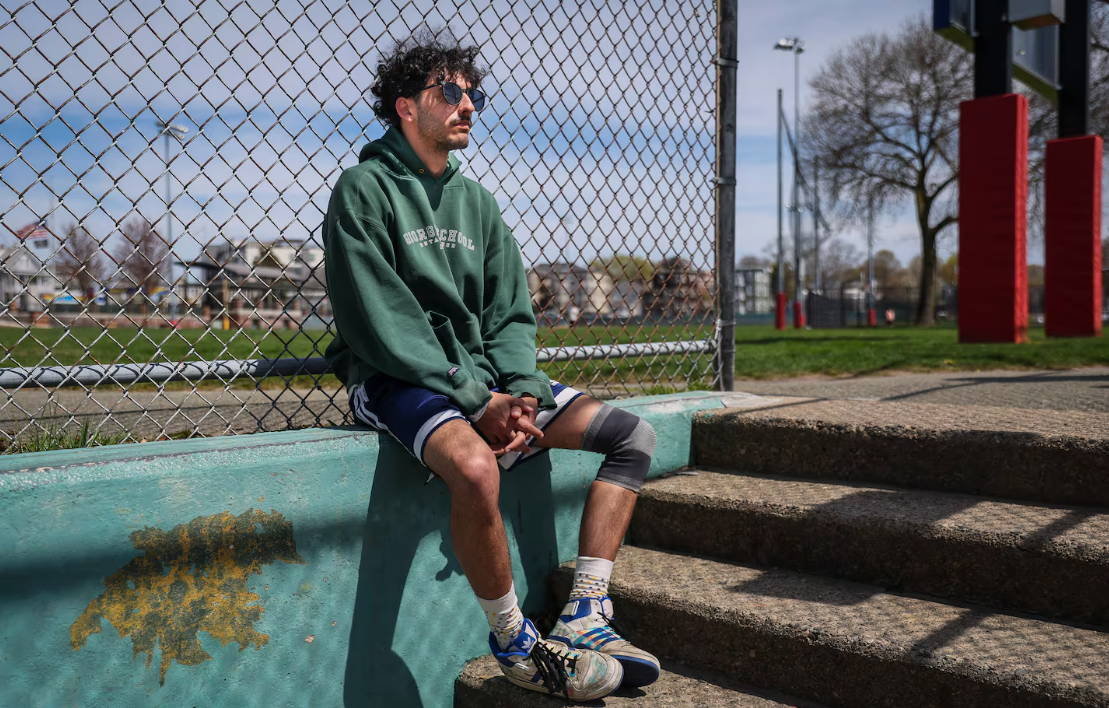数千人在校园抗议活动中被捕 对于学生来说后果才刚刚开始

【中美创新时报2024 年 8 月 2 日编译讯】(记者温友平编译)今年春天,在支持巴勒斯坦的抗议加沙战争的帐篷营地浪潮中,约有 3,200 人在大学校园被捕。许多学生的指控被驳回。但根据美联社和包括《波士顿环球报》在内的合作新闻编辑室收集的数据的分析,在逮捕人数最多的校园中,数百起案件尚未解决。《波士顿环球报》记者希拉里·伯恩斯(Hilary Burns)、纳穆·桑帕特(Namu Sampath)、莫妮卡·奥布拉多维奇(Monica Obradovic)和克里斯托弗·L·凯勒(Christopher L. Keller)对此作了下述综合报道。
自从在马萨诸塞大学的一次抗议活动中被捕以来,安妮·麦格鲁一直在两场听证会之间来回奔波:一场是在法庭上,因轻罪指控,另一场是在学校,因违反大学的行为准则。
这让这位研究生无法完成她的经济学论文。
“自从我被捕以来,这几个月对我来说真的很艰难,”麦格鲁说。“我从来没有想过马萨诸塞大学会这样回应。”
今年春天,在支持巴勒斯坦的抗议加沙战争的帐篷营地浪潮中,约有 3,200 人在大学校园被捕。虽然一些学校通过与学生达成协议来结束示威活动,或者只是等待他们离开,但其他学校在抗议者拒绝离开时报警。
许多学生的指控被驳回。但根据美联社和包括《波士顿环球报》在内的合作新闻编辑室收集的数据的分析,在逮捕人数最多的校园中,数百起案件尚未解决。
其中一些学生在学业上面临不确定性,而另一些学生则对是否继续在大学就读心存疑虑。有些人受伤,影响了学业。
在波士顿的爱默生学院,警方执行了一项禁止在公共场所露营的城市法令,逮捕了 118 人,其中包括 69 名爱默生学生。检察官表示,所有人都被指控扰乱治安,并获得了“提审前转移”,这意味着不会提出任何指控,但需要 40 小时的社区服务。
爱默生学生欧文·巴克斯顿 (Owen Buxton) 表示,4 月 25 日,他被警察推到抗议发生地小巷里的一尊青铜雕像上,遭受了脑震荡。出狱后,他乘坐 Uber 前往附近的急诊室。
这是 22 岁的巴克斯顿上学期第二次因抗议加沙战争而被捕。他必须完成 80 小时的社区服务才能避免受到指控。他说,经历所谓的“国家暴力”造成的脑震荡和创伤使巴克斯顿很难在春季学期的剩余时间集中注意力或参加课程。爱默生允许学生在被捕后参加学期及格或不及格考试。
“它扼杀了我所有的创造力。几个月来我什么都没做,这对我来说很不寻常,”电影制片人巴克斯顿说。 “即便是现在,说话也更加困难,表达想法也更加困难。我所做的一切都笼罩在一片阴霾中,这真的很令人沮丧。”
波士顿警察局的一位发言人表示,有顾虑的人可以向其内部事务办公室提出投诉。
爱默生大学的一位发言人表示,学院“关心所有学生的福祉”,并“鼓励任何需要身体或心理健康服务的学生寻求支持。”
随着学生们今年秋天返校,各大学正准备迎接更多针对以色列军队和哈马斯的抗议活动,并制定策略,包括何时呼叫执法部门——这些决定将产生持久的影响。
一些大学领导表示,呼叫警察是结束抗议活动的唯一选择,抗议活动阻碍了毕业典礼,扰乱了校园生活,包括反犹太主义标志和语言。学生团体和一些教职员工批评大学领导邀请警察进入校园。
针对示威者的绝大多数案件,无论是针对学生、教职员工还是与大学没有任何关系的人,都涉及轻罪或较低级别的指控,例如非法侵入和扰乱治安。
根据美联社对至少有 100 人被捕的校园数据的审查,在许多情况下,官员表示他们不打算追究低级别违法行为。
在纽约州北部,阿尔斯特县地方检察官要求法官驳回 129 起因纽约州立大学新帕尔茨分校逮捕事件而引发的案件。
纽约州立大学新帕尔茨分校的一名学生示威者埃兹拉·巴普蒂斯特 (Ezra Baptist) 表示,他在被州警逮捕时被向前抛出并撞到头部,导致脑震荡和割伤,随后被送往医院。由于受伤,他本应避免看屏幕,因此无法完成 5 月份毕业所需的一门课程。
纽约州警方表示,任何认为警员行为不当的人都可以提出投诉,以便进行调查。现场的另一个警察机构,即县治安官办公室表示,警察表现出克制,一名警员在示威者投掷瓶子时受伤。
在圣路易斯,瓦伦西亚·阿尔瓦雷斯 (Valencia Alvarez) 正在等待她和其他 99 人可能面临的指控,因为 4 月 27 日在圣路易斯华盛顿大学举行的抗议活动持续了不到半天。
被捕者中有 23 人是学生。6 月,学校给了他们两个选择:与学生行为办公室举行听证会,或者“承担责任”并放弃进一步调查。阿尔瓦雷斯选择了第一个选择。
“我真的不打算对此保持沉默,我认为这是第二个选择的目标,”阿尔瓦雷斯说。
在等待案件解决的同时,阿尔瓦雷斯还没有获得公共卫生硕士学位,如果不是因为被捕,她现在本可以获得这个学位。
“我想要那个学位,”阿尔瓦雷斯说。“我在华盛顿大学两年期间打了四份工,这样就能够负担得起学费,而不用贷款。”
学生并不是唯一受到抗议活动持久影响的人。
达特茅斯学院历史学教授安妮莉丝·奥莱克 (Annelise Orleck) 在 5 月 1 日于学院绿地上被捕后,最近重新开始接受创伤后应激障碍治疗。89 人被捕,其中包括两名学生记者,他们的指控后来被撤销。
奥莱克被指控非法侵入,但检察官在 7 月撤销了对她的指控。汉诺威警察局发言人表示,34 人的指控已被撤销;另外 54 人的指控被减轻为违法;一人因拒捕而面临轻罪。
奥莱克说,身着防暴装备的州警察将她推倒在地,然后跪在她背上。她告诉他们她无法呼吸。
达特茅斯发言人拒绝置评。
在马萨诸塞大学阿默斯特分校,学生们回忆起 5 月 7 日警察到达并逮捕 134 人之前的和平示威。马萨诸塞大学校长哈维尔·雷耶斯后来在给校园社区的一封信中写道,在与抗议者的讨论破裂后,他下令进行扫荡是“绝对的最后手段”。
在逮捕人员接受处理时,跨性别人类学研究生查尔斯·沙利文 (Charles Sullivan) 表示,他们感到被校园警察羞辱了。沙利文说,一名警官强迫她们大声描述自己的生殖器,才能进入洗手间。
沙利文后来决定离开大学继续学业,部分原因是被捕。沙利文将于秋季前往俄亥俄州攻读博士学位,而不是继续在麻省大学学习。
“我想我主要是想离开这个地方了,”沙利文说。
美联社的教育报道得到了多个私人基金会的资金支持。美联社对所有内容负全部责任。在 AP.org 上查找美联社与慈善机构合作的标准、支持者名单和资助报道领域。
美联社记者杰克·奥芬哈茨 (Jake Offenhartz)、纽约奥尔巴尼的迈克尔·希尔 (Michael Hill) 和康涅狄格州哈特福德的迈克尔·梅莉亚 (Michael Melia) 对本报告做出了贡献。
题图:爱默生学生欧文·巴克斯顿表示,他被警察推到一座青铜雕像上后遭受了脑震荡。Erin Clark/Globe Staff
附原英文报道:
Thousands were arrested at campus protests. For students, the fallout was only beginning.
By Hilary Burns, Namu Sampath, Monica Obradovic and Christopher L. Keller Globe Staff, The Springfield Republican, The St. Louis Post-Dispatch and The Associated Press,Updated August 2, 2024
AMHERST — Since her arrest at a protest at the University of Massachusetts, Annie McGrew has been pivoting between two sets of hearings: one in court, for misdemeanor charges, another at school, for violations of the college’s conduct code.
It has kept the graduate student from work toward finishing her dissertation in economics.
“It’s been a really rough few months for me since my arrest,” McGrew said. “I never imagined this is how UMass would respond.”
Some 3,200 people were arrested on college campuses this spring during a wave of pro-Palestinian tent encampments protesting the war in Gaza. While some schools ended demonstrations by striking deals with the students, or simply waited them out, others called in police when protesters refused to leave.
Many students had those charges dismissed. But hundreds of cases have yet to be resolved on campuses with the highest number of arrests, according to an analysis of data gathered by the Associated Press and partner newsrooms, including The Boston Globe.
Some of those students face uncertainty in their academic careers, while others harbor doubts about whether to stay enrolled in college at all. Some had injuries that interfered with their school work.
At Emerson College in Boston, 118 people were arrested, including 69 Emerson students, when police enforced a city ordinance against camping on public property. All were charged with disturbing the peace and granted “pre-arraignment diversion,” which means no charges would be filed in exchange for 40 hours of community service, prosecutors said.
Owen Buxton, an Emerson student, said he suffered a concussion after being shoved by police into a bronze statue in the alleyway where the protest took place on April 25. He took an Uber to a nearby emergency room after being released from jail.
It was the second time Buxton, 22, was arrested last semester for protesting the war in Gaza. He must complete 80 hours of community service to avoid being charged. The concussion and trauma of experiencing what he called “state violence” made it hard for Buxton to concentrate or participate in his classes for the rest of the spring semester, he said. Emerson allowed students to take the semester pass-fail after the arrests.
“It stifled all my creativity. I didn’t make anything for months, which is not typical of me,” said Buxton, a filmmaker. “Even right now, talking is more difficult, getting ideas out is more difficult. There’s a constant haze over everything that I’m doing, and it’s really frustrating.”
A spokesperson for the Boston Police Department said individuals with concerns can file complaints with its internal affairs office.
A spokesperson for Emerson said the college “cares about the well-being of all of our students” and “encourages any student in need of physical or mental health services to reach out for support.”
As students return this fall, colleges are bracing for more protests against both Israel’s military and Hamas, and strategizing over tactics, including when to call in law enforcement — decisions that have lasting reverberations.
Some college leaders said calling in the police was the only option to end protests that stood in the way of commencement ceremonies, disrupted campus life, and included instances of antisemitic signs and language. Student groups and some faculty members have criticized college leaders for inviting police inside their gates.
The vast majority of cases against the demonstrators, whether against students, faculty, or people without any ties to the colleges, involve misdemeanors or lower-level charges such as trespassing and disorderly conduct.
In many cases, officials indicated they do not intend to pursue low-level violations, according to AP’s review of data on campuses with at least 100 arrests.
In upstate New York, the Ulster County district attorney asked judges to dismiss 129 cases stemming from arrests at the State University of New York at New Paltz.
One SUNY-New Paltz student demonstrator, Ezra Baptist, said he was taken to a hospital with a concussion and a cut after being thrown forward and hitting his head during his arrest by state troopers. He was supposed to avoid looking at screens because of his injury and could not complete one class that he needed to graduate in May.
New York State Police said anyone who believes troopers acted inappropriately can file a complaint so it can be investigated. Another police agency at the scene, the county sheriff’s office, said that officers showed restraint and that a trooper was injured when demonstrators threw bottles.
In St. Louis, Valencia Alvarez is waiting to hear what will come of the potential charges she and 99 others could face for a protest on April 27 that lasted less than half a day at Washington University in St. Louis.
Twenty-three of those arrested were students. In June, the university gave them two options: a hearing with the Office of Student Conduct, or “accept responsibility” and forgo further investigation. Alvarez took the first option.
“I don’t really plan on being quiet about this, and I think that’s the goal of the second option,” Alvarez said.
While she awaits the resolution of her case, Alvarez does not have the master’s degree in public health she would have received by now if not for her arrest.
“I want that degree,” Alvarez said. “I worked four jobs throughout my two years at Wash U to be able to afford tuition without pulling out any loans.”
Students were not the only ones to experience lasting effects from the protests.
Annelise Orleck, a history professor at Dartmouth College, recently restarted therapy for post traumatic stress symptoms after being arrested on the college green on May 1. Eighty-nine people were arrested, including two student journalists whose charges were later dropped.
Orleck was charged with criminal trespassing, but prosecutors dropped her charge in July, Orleck said. Charges have been dropped for 34 people; another 54 people have had their charges reduced to violations; and one person faces a misdemeanor for resisting arrest, a spokesperson for the Hanover Police Department said.
Orleck said state police in riot gear shoved her to the ground, then kneeled on her back. She told them she couldn’t breathe.
A spokesperson for Dartmouth declined to comment.
At UMass Amherst, students recalled a peaceful demonstration before police arrived May 7 and arrested 134 people. UMass chancellor Javier Reyes later wrote in a letter to the campus community that he ordered the sweep as an “absolute last resort” after discussions with protesters broke down.
As arrestees were processed, Charles Sullivan, a graduate student in anthropology who is transgender, said they felt humiliated by campus police. An officer, Sullivan said, forced them to loudly describe their genitalia to gain access to a restroom.
Sullivan has since decided to leave the university to continue their studies, in part because of the arrest. Sullivan will move to Ohio in the fall to pursue a Ph.D., instead of continuing at UMass.
“I think mostly I’m just kind of ready to get out of this place,” Sullivan said.
The Associated Press’ education coverage receives financial support from multiple private foundations. AP is solely responsible for all content. Find AP’s standards for working with philanthropies, a list of supporters and funded coverage areas at AP.org.
Associated Press writers Jake Offenhartz in New York, Michael Hill in Albany, N.Y., and Michael Melia in Hartford, Conn., contributed to this report.

